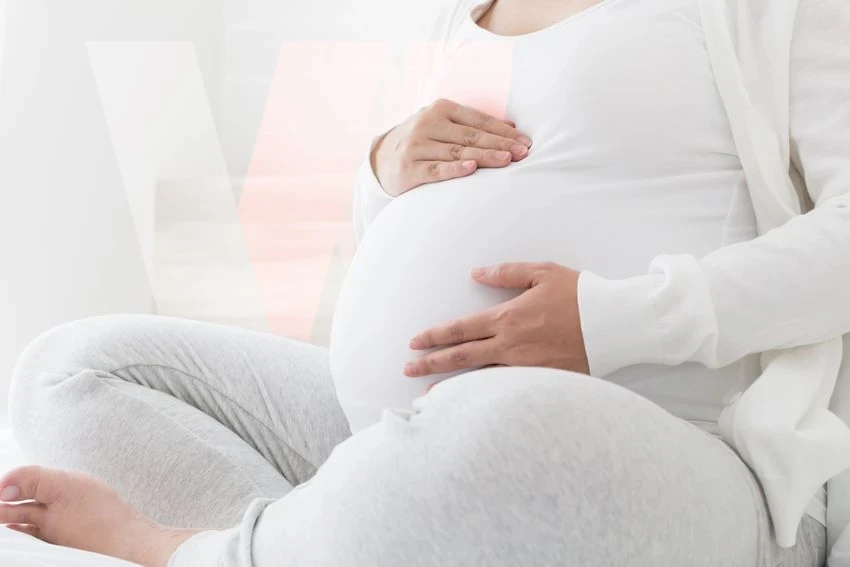Table of contents
Why You Shouldn’t Smoke During Pregnancy
Smoking poses dangers not only to the smoker but also to those around them, including the fetus during pregnancy. Several studies1, 2, 3, 4 indicate that smoking while pregnant increases the risks of:
- Miscarriage
- Premature birth
- Ectopic pregnancy
- Low birth weight, which poses health risks for the baby
- Premature placental abruption
- Sudden infant death syndrome (SIDS)
- Respiratory problems at birth
- Growth retardation
Risks of Smoking During Pregnancy
Complications from smoking during pregnancy arise from certain compounds in cigarette smoke, such as lead, mercury, polycyclic aromatic hydrocarbons (PAHs), cadmium, cyanide, and carbon monoxide.
Respiratory Issues
Carbon monoxide in cigarette smoke leads to chronic oxygen deficiency for the fetus, doubling its concentration in the baby’s blood compared to the mother’s. This increases the child’s risk of respiratory problems and other pathologies.
Additionally, carbon monoxide is produced during the incomplete combustion of carbon-based materials, such as fossil fuels and forest fires. In homes, it can form from wood, butane, fuel, natural gas, petroleum, or propane heating systems, which is why regular ventilation in winter is essential.
Vaping, which heats e-liquid without burning it, eliminates combustion residues found in tobacco. Therefore, using an e-cigarette during pregnancy should reduce harm for both mother and child.
Risks of Obesity, Hypertonicity, and Learning Delays
Fetal exposure to smoking can have neurotoxic effects, making newborns more excitable and hypertonic. They require more handling and show more signs of stress or withdrawal, particularly in the central nervous system, gastrointestinal, and visual regions5. A 2002 German study6 found a link between maternal smoking during pregnancy and increased obesity risk in children. A 1973 study7 concluded that children of mothers who smoked during pregnancy were shorter and had a five-month delay in reading, math, and general abilities compared to non-smokers’ children.
Early Menopause and Reduced Fertility
Smoking reduces women’s chances of conceiving8, 9, 10 by decreasing ovocyte numbers, necessary hormones for embryo implantation, and pregnancy rates. Menopause also occurs two years earlier in smokers.
Nicotine’s Minimal Effects on Fetal Health
Most dangers of smoking during pregnancy come from harmful smoke compounds. However, nicotine, while best avoided, has been studied11, 12, 13, 14 in pregnant women using nicotine replacement therapy (patches, gum, nasal spray). Research generally concludes that nicotine alone has minimal impact on newborn health, with no significant differences between babies born to mothers using nicotine therapy and those who did not consume nicotine at all.
Several studies state: “The benefits of nicotine replacement therapy to help pregnant women quit smoking outweigh the risks of continued smoking or nicotine replacement itself.”
Advantages of E-Cigarettes for Pregnant Smokers

While vaping should be avoided, current data are reassuring regarding its potential harm to mother and child. Due to the absence or reduced amounts of harmful compounds in e-cigarette vapor compared to tobacco smoke, vaping could limit risks for the fetus.
Normal Birth Weight for Babies
Research conducted over recent years16, 17, 18 indicates that babies born to vaping mothers have similar average birth weights to non-smokers and non-vapers. These findings were confirmed by a 2021 meta-analysis16.
No Increased Risks During Delivery
Studies on delivery mode, perineal trauma, and postpartum hemorrhage rates found no significant differences between e-cigarette users and non-smokers/non-vapers. No cases of neonatal respiratory distress were noted.
Researchers conclude that using an e-cigarette during pregnancy “is not associated with low birth weight or premature birth” and that “maternal and neonatal outcomes appear similar to those of non-smokers.”
Reduced Risks Compared to Smoking
A 2020 study19 on mice concluded that “low-dose e-cigarette use during pregnancy is less toxic than cigarette smoke.” Another 2021 study20 indicated that “vaping products can reduce the health risks associated with smoking,” specifically for pregnant women.
In summary, while avoiding smoking and vaping during pregnancy is best, e-cigarettes are a better alternative to smoking. Their effectiveness in quitting smoking is higher than other nicotine replacements, both in the general population and specifically for pregnant women21.
This article does not constitute medical advice. Consult a healthcare professional if in doubt.
Sources and References
1 Sven Cnattingius, The epidemiology of smoking during pregnancy: Smoking prevalence, maternal characteristics, and pregnancy outcomes, Nicotine & Tobacco Research, Volume 6, Issue Suppl_2, April 2004, Pages S125–S140, https://doi.org/10.1080/14622200410001669187
2 Alison K. Shea, Meir Steiner, Cigarette Smoking During Pregnancy, Nicotine & Tobacco Research, Volume 10, Issue 2, February 2008, Pages 267–278, https://doi.org/10.1080/14622200701825908
3 A. Castles, E.K. Adams, C.L. Melvin, C. Kelsch, M.L. Boulton. Effects of smoking during pregnancy. Five meta-analyses. Am. J. Prev. Med, 16 (3) (1999), pp. 208-215. https://doi.org/10.1016/S0749-3797(98)00089-0
4 M.B. Meyer et al. Maternal smoking, pregnancy complications, and perinatal mortality. Am. J. Obstet. Gynecol (1977). https://doi.org/10.1016/0002-9378(77)90031-X
5 Karen L. Law, Laura R. Stroud, Linda L. LaGasse, Raymond Niaura, Jing Liu, Barry M. Lester; Smoking During Pregnancy and Newborn Neurobehavior. Pediatrics June 2003; 111 (6): 1318–1323. 10.1542/peds.111.6.1318. https://doi.org/10.1542/peds.111.6.1318
6 Rüdiger von Kries, André Michael Toschke, Berthold Koletzko, William Slikker, Maternal Smoking during Pregnancy and Childhood Obesity, American Journal of Epidemiology, Volume 156, Issue 10, 15 November 2002, Pages 954–961, https://doi.org/10.1093/aje/kwf128
7 Br Med J 1973; 4 doi: https://doi.org/10.1136/bmj.4.5892.573 (Published 08 December 1973)
8 C Augood, K Duckitt, A A Templeton, Smoking and female infertility: a systematic review and meta-analysis., Human Reproduction, Volume 13, Issue 6, 1 June 1998, Pages 1532–1539, https://doi.org/10.1093/humrep/13.6.1532
9 Donald R. Mattison, The effects of smoking on fertility from gametogenesis to implantation, Environmental Research, Volume 28, Issue 2, 1982, Pages 410-433, ISSN 0013-9351, https://doi.org/10.1016/0013-9351(82)90139-6.
10 Baird DD, Wilcox AJ. Cigarette Smoking Associated With Delayed Conception. JAMA. 1985;253(20):2979–2983. doi:10.1001/jama.1985.03350440057031
11 Dempsey, D.A., Benowitz, N.L. Risks and Benefits of Nicotine to Aid Smoking Cessation in Pregnancy. Drug-Safety 24, 277–322 (2001). https://doi.org/10.2165/00002018-200124040-00005
12 Coleman T , Cooper S , Thornton JG , et al . A randomized trial of nicotine-replacement therapy patches in pregnancy. N Engl J Med 2012;366:808–18. doi:10.1056/NEJMoa1109582
13 Benowitz NL. Nicotine Replacement Therapy During Pregnancy. JAMA. 1991;266(22):3174–3177. doi:10.1001/jama.1991.03470220090034
14 Haustein KO. Cigarette smoking, nicotine and pregnancy. International Journal of Clinical Pharmacology and Therapeutics. 1999 Sep;37(9):417-427. PMID: 10507240.
15 Goel, P; Radotra, A; Singh, I; Aggarwal, A; Dua, D. Effects of passive smoking on outcome in pregnancy. Journal of Postgraduate Medicine 50(1):p 12-16, Jan–Mar 2004.
16 Electronic cigarette use in pregnancy is not associated with low birth weight or preterm delivery (PDF).
17 McDonnell, B.P., Bergin, E., Regan, C., 2019. 186: Electronic cigarette use in pregnancy is not associated with low birth weight or preterm delivery. American Journal of Obstetrics & Gynecology 220, S137. https://doi.org/10.1016/j.ajog.2018.11.207.
18 McDonnell, BP, Dicker, P, Regan, CL. Electronic cigarettes and obstetric outcomes: a prospective observational study. BJOG 2020; https://doi.org/10.1111/1471-0528.16110.
19 G Li et al. Replacing smoking with vaping during pregnancy: impacts on metabolic health in mice. Reprod Toxicol (2020). https://doi.org/10.1016/j.reprotox.2020.07.012
20 Robert Calder, Eleanor Gant, Linda Bauld, Ann McNeill, Debbie Robson, Leonie S Brose, Vaping in Pregnancy: A Systematic Review, Nicotine & Tobacco Research, Volume 23, Issue 9, September 2021, Pages 1451–1458, https://doi.org/10.1093/ntr/ntab017
21 Hajek, P., Przulj, D., Pesola, F. et al. Electronic cigarettes versus nicotine patches for smoking cessation in pregnancy: a randomized controlled trial. Nat Med 28, 958–964 (2022). https://doi.org/10.1038/s41591-022-01808-0.







